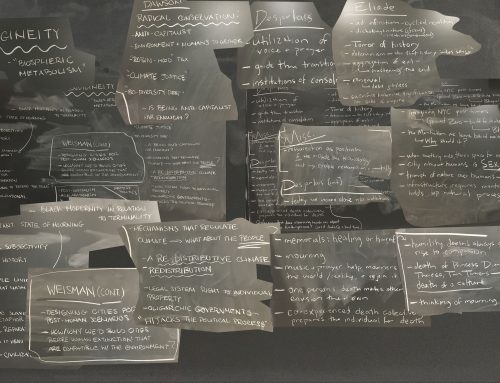Danielle Duemesi
A City Without Us, a piece by Alan Weisman, details the deterioration of New York when it becomes absent of human life. I will admit that on reading this piece, there were some bits about New York I didn’t know about. There’s a lot of maintenance to retain a city structure. What shocked me the most was that there are rivers beneath our subways and that groundwater is always pushing up unless there are all hands on deck, especially during rain or poor weather conditions.
Weisman describes the self-destruction of a city without us in a way similar to one of our readings earlier in the semester, in which he really illustrates what it would look like. Even though we won’t be there to experience it in the time he’s supposed, he makes it feel like we’re watching it unfold. And if I could go back to my comment about the earlier reading, this makes a very engaging piece in that it compels by provoking the emotions and the senses. We have little glimpses where he talks about the people he’s receiving many post-human world theories from, and even that helps to describe the people at hand and at work to maintain the city we live in. It gives them personality and a relatable-ness, and reminds us that we’re on the same plane of existence as Briffa or Ahmad. They’re not names to drop in order to fear monger us, they’re people whose thoughts we should engage with in a positive and optimistic manner.
I will admit that the visual description of the city without us kinda sounds beautiful. There was one line I liked on page 32, 7 if you’re opening the PDF, and it reads, “Buildings groan as their innards expand and contract; joints between walls and rooflines separate. Where they do, rain leaks in, bolts rust, and facing pops off, exposing insulation. If the city hasn’t burned yet, it will now.” I don’t want to sound controversial but… that was sexy. Like if the end of the world is that sex appealing, let’s die out!
In all seriousness, Weisman talks a lot about how our city requires a lot of maintenance and a lot of deliberate decision in order to make it what we want it. We introduce foreign plants to beautify the city but don’t realize it kills tree species. We’re enamored by specks of nature that bedazzle our cityscape, and celebrate it when we decide we care by turning it into a park, another closed in space where we control how nature exists in our city. I think a lot of arguments can be said for Weisman, but I think the most important is realizing how our city functions, with and without us, and what we can do with this information in order to take care of a concrete jungle, and the nature aching to bloom from beneath it.
Then we move on to the Terror of History by Mircea Eliade. This one was a little tough to read just by word use alone, and I felt I had to reread a lot of it because of so many big words crammed into one sentence. But I think the general gist of Eliade was that throughout history, there’s been justification for harmful, human acts. And this history is justified even today, as we continue the legacy of harmful procedures in order to maintain control.
Where Weisman talks about the physical environment we exist in, Eliade discusses the social environment. I think the two can be intertwined in the notion that we need to realize there is an urge to dominate, and that history indicates a consistency to control.
Eliade states on page 151, or 9 in the PDF, that, “for the greater part of mankind, still clinging to the traditional viewpoint, history did not have, and could not have, value in itself. Every hero repeated the archetypal gesture, every war rehearsed the struggle between good and evil, every fresh social injustice was identified with the sufferings of the Saviour… each new massacre repeated the glorious end of the martyrs. It is not our part to decide whether such motives were puerile or not, or whether such a refusal of history always proved efficacious. In our opinion, only one fact counts: by virtue of this view, tens of millions of men were able, for century after century, to endure great historical pressures without despairing, without committing suicide or falling into that spiritual aridity that always brings with it a relativistic or nihilistic view of history.”
… Whew. That was heavy. But ok, we shake it out a bit and we can return to this with a takeaway. Systems of power expected those that they have affected to understand and accept the ways they hurt and discriminate. They expected people to agree to inferiority instead of equality. The systems of power continuously sought to maintain and regulate who has access to power, for giving it up or not exercising it meant that they were on par with those deemed inferior.
Eliade continues on with the idea of existence becomes more precarious because of history. But he concludes with the proposal of abandoning this “paradise” that involves archetypes and a repeating of history. He points his finger at Christianity specifically for having a hand in this idea of a power legacy, but suggests that a reforming of ideas can create new faith, and with this faith, new ideas of liberation and freedom.
To summarize, there is an existing idea or desire that we need to dominate, and both Weisman and Eliade suggest that we have reasons to maintain power. We need to realize where our desires come from, and dismantle a system before we can rewrite our own that encourages a more fruitful outcome.

Recent Comments